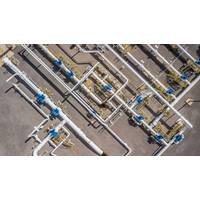Saudis, OPEC Would Cover Ukraine-Related Oil Shortage
Saudi oil minister Naimi says $100/bbl is fair price for everybody. Naimi: OPEC should keep its 30-mln-bpd output cap unchanged at June meet.
Top global oil exporter Saudi Arabia will step in to cover any potential shortage arising from the Ukraine crisis, its oil minister said on Monday.
Saudi Arabia, the only oil producer which can significantly alter output in response to changing demand, has in the past two years played the leading role in cushioning against supply disruptions from Libya, Nigeria, Iraq and South Sudan.
Russia, whose output has almost doubled over the past 15 years to more than Saudi Arabia's, has always pumped at full stretch. It has irked Riyadh several times by first agreeing to cooperate in output policy, but then doing very little to reduce production.
Riyadh feels the need to trumpet its unique supply role at a time of soaring U.S. output due to the shale boom, which has prompted politicians there to call for an end to the era of dependence on Middle East oil and the naval protection of sea routes in the region.
"We are willing to supply any shortage which may arise," said Saudi Oil Minister Ali al-Naimi. He said the kingdom's current output is around 9.6 million barrels per day (bpd), while it has a capacity of 12.5 million bpd.
Russia's annexation of Ukraine's Crimean peninsula and violence in eastern Ukraine have rattled oil markets, keeping benchmark Brent futures near $108 a barrel after hitting $112.39 on March 3, the highest this year.
Naimi said that both Saudi Arabia and the Organization of the Petroleum Exporting Countries would meet any additional demand for oil.
"Wherever demand is needed, we and other OPEC members will supply," he said.
Speaking on the sidelines of a conference in Seoul, Naimi also said $100 a barrel was a fair price for oil.
"One-hundred dollars is a fair price for everybody - consumers, producers, oil companies," he said. "It's a fair price. It's a good price."
NO REASON FOR CHANGE IN VIENNA
Naimi said OPEC should maintain its current output cap of 30 million bpd when it comes up for review at the group's meeting on June 11 in Vienna.
"Supply is highly sufficient, demand is great and the market is fairly stable," Naimi said.
"There is no reason for a change. Absolutely no reason."
OPEC faces the problem of accommodating rapidly rising oil output from Iran and Iraq, both aiming to restore full output after sanctions and civil strife.
OPEC's No.2 and No.3 producers respectively feel they are special cases because of production lost to sanctions - Iraq over decades under Saddam Hussein up to 2003 and Iran over the past two years for its nuclear programme.
But Naimi ruled out any plans for Saudi Arabia to adjust output to make way for others.
"People like our oil - why reduce?" he said, when asked if the kingdom would cut production to accommodate rising output from other producers.
Naimi also said that total global oil demand was steady.
"Don't worry about individual countries - look at the total," he said.
OPEC in March said world oil demand will increase more than expected in 2014, raising its prediction for a second straight month as U.S. and European economic growth picked up.
In a monthly report, OPEC said global demand will rise by 1.14 million bpd this year, up 50,000 bpd from its previous forecast. It also raised its 2014 projection for global demand for OPEC's crude to 29.7 bpd, up 100,000 bpd from the previous month's report.
By Meeyoung Cho and Jane Chung


